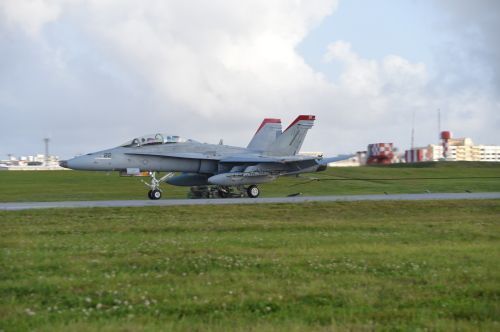FA18 jets fly at MCAS Futenma 25 years after return agreement, harm continues with 115 decibel noise

FA18 combat jet stopping by hooking the hook at the back of the plane to the wire hung over the runway, around 5:30 p.m. on April 12 at Marine Corps Air Station Futenma in Ginowan (photograph by Keizo Shinzato)
April 13, 2021 Ryukyu Shimpo
On the evening of April 12, exactly 25 years after the agreement was made to completely close U.S. Marine Corps Air Station (MCAS) Futenma in 1996, four FA18 combat jets from MCAS Iwakuni in Yamaguchi Prefecture arrived one after another to MCAS Futenma, exposing the surrounding cities and towns to explosive noise. Their training continued into the night. Though a quarter of a century has passed since the return agreement, there is no change in the reality of U.S. military aircraft flights causing harm to surrounding residents, and the severity of the situation only continues to increase.
According to the Okinawa Prefectural Government, noise of 115.8 decibels was recorded at 5:30 p.m. in the Ueojana area of Ginowan. 110 decibels is equivalent to the sound of a vehicle alarm heard up close, and 120 decibels is considered to be near the limit of a human’s hearing capacity.
On the evening of April 12, U.S. Marine troops stationed in Okinawa revealed details of their training at MCAS Futenma to the Ryukyu Shimpo and others. When asked why the training was carried out on April 12, James Pryor, commanding officer of the Marine Wing Support Squadron 172, who responded to the request for an interview, stated that the training was part of training carried out in various locations, and just happened to be scheduled for MCAS Futenma on that day. Regarding the noise, he said that the Marines intend to carry out their training with consideration to the balance between readiness and the concerns of residents.
The flights were part of training related to the strategic concept of EABO (Expeditionary Advanced Base Operations) in which temporary bases for resupply and attacks are stationed on remote islands and the like. The training on April 12 was carried out assuming scenarios such as a short runway, and involved a wire being attached to the planes so that they could make a short-distance landing and then take off once more. Related training will continue until April 17.
(English translation by T&CT and Sandi Aritza)
Previous Article:Himeyuri Peace Museum reopens after renovation, “to show that our grandparents’ generation was not just one that experienced war”
Next Article:Urgent youth statement calling for halt in plans to obtain soil published online: “Support for Gushiken’s hunger strike”
[Similar Articles]
- Seven years after the deployment of MV-22 Ospreys to MCAS Futenma, night flights outside the agreed upon times increasing
- “It was so loud that I couldn’t sleep”, Osprey land on MCAS Futenma just before 11:00 p.m.
- U.S. military nighttime takeoffs/landings violate noise-prevention agreement, citizens complain
- Complaints of aircraft noise from Air Station Futenma at a record high of 684
- Takeoffs/landings at Futenma Air Station in 2020 reaches record high of 17,500 for the year
 Webcam(Kokusai Street)
Webcam(Kokusai Street)


